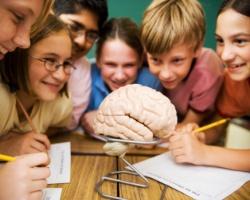My encounter with the human brain as it’s related to adolescent spiritual formation started in 1995 when I struck up a friendship with Dr. Frank Minirth, a well-known Christian psychiatrist. Minirth’s generous conversations led me to view the development of wisdom from a neuro-biological framework and not just from one of discipleship or biblical instruction. I’d read Richard Restak’s The Brain, Brainscapes and Receptors and learned that we may not be leveraging the full extent of our knowledge of the brain. It turns out the God who gave us the hardware, provided the software too.
The Brain Needs Community
I feel the most significant insight regarding the brain to emerge out in the past 15 years is how relational it is. Dr. Dan Siegel in his book The Developing Mind discusses the significant impact between our relationships and the brain and how that shapes who we are.1
Recent technology has given us access to the inner workings of the brain, helping us understand the neurobiological realities of human relationships. In 2002, the institute for American Values published a report with Dartmouth Medical School and the YMCA based on a symposium of 33 pediatric and adolescent health professionals to discuss the increase they were seeing in depression, apathy, violence and the need for psychotropic medications among children and teens. The group, informed with new understanding of brain biology and relationships made this extraordinary claim: “Human beings are biologically primed to seek moral and spiritual meaning, and nurturing relationships are a central foundation for positive moral and spiritual development.”2
The report continued, “The presence or absence of a nurturing environment during childhood not only shapes a child’s psychological and emotional development but also alters brain development in ways that profoundly affect long-term health.”3
The recommendation was ultimately that what is lacking in our larger society is authoritative community. We know this type of community to be the foundation of the church when sound ecclesiology is practiced. This requires an environment of unconditional love. The opportunity for deep relationships where lives are shared, culture is made, and identity is nurtured.
The lack of such community experienced in our cities, schools, places of work and neighborhoods also is reflected in the architecture of what the practice of church has become, where anonymity is easy to maintain and deep relationships are seldom required despite provisions for them to form.
Our youth gatherings are much more than social or teaching platforms. The community we help create actually can heal the brain and satisfy its biological need for community.
The Brain Needs Confession
In Blink!, Malcolm Gladwell explored the idea that we know more than we can articulate, building off the notion that our brains have two systems of knowing, one that is explicit and can recall information that has occurred in time and the other implicit, which is primarily emotional and non-verbal, what we call our gut or instinct. Along with this idea is that the brain has two memory systems, one we use consciously to store and recall information, and another that stores information unconsciously, and which we recall unconsciously.
According to Dr. Todd Hall at Biola University, who has done extensive research applying attachment theory to our relationship with God, these two memories create relational filters that enhance or inhibit our relationship to God and others. Because we have these two ways of knowing and two memory systems, we often don’t know why we react to other people (or to God) the way we do.4, 5
Apparently our two knowledge and memory systems work together when we tell our stories. In our stories we reflect both systems, and if you know what to listen (and look) for, a diagnosis can be made. Here’s where Hall’s research really becomes exciting to me. Telling our stories not only requires the two systems to work together, but telling our stories actually heals the brain, especially when stories are told in the midst of a loving and healthy community.
James’ instruction to confess our sins to one another (v. 5:16) was not just an admonition of a spiritual practice, but as Hall would infer, confession and other spiritual disciplines outlined in Scripture promote profound neurobiological healing, as well.
Neuroscience is helping me understand how the lack of certain practices outlined in Scripture hurts Christians emotionally and relationally. My ecclesiology has been strengthened, and the practice of church unleashed as I’ve seen its significance in integrating the spiritual and physical world we inhabit under the sun.
1 Siegel, Daniel J. The Developing Mind : How Relationships and the Brain Interact to Shape who We Are. New York: Guilford Press, 2012. Print.
2 Hardwired to Connect. Institute for American Values. New York: Institute for American Values, 2003.
3 Ibid.
4 Journal of Psychology and Christianity 2004, Vol. 23, No. 1,66-81 Copyright 2004 Christian Association for Psychological Studies.
5 Journal of Psychology and Theology 2001, Vol. 29, No. 1, 4-21 Copyright 2001 by Rosemead School of Psychology Biola University.
Click here for more information about the Spiritual Transformation Index.




